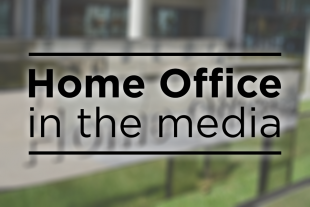Today's Home Office stories include on the Home Secretary's apology for the Government unlawfully requiring DNA samples from people seeking to visit or stay in the UK. There are also stories on stop and search figures and medicinal cannabis.

Home Secretary apologises for migrant DNA tests
There is widespread reporting of the Home Secretary’s announcement that a review has found the department unlawfully required DNA samples from people seeking to visit or stay in the UK.
The Home Secretary announced in Parliament yesterday that there were at least 449 cases, including the children of Gurkhas and Afghan translators who had worked for the Armed Forces. The Times notes that the true “scale of the blunder” is unknown.
The Times give a further breakdown of statistics which show that 83 applicants had to give DNA as part of a Government operation in 2016 investigating fraud, and 51 relatives of Gurkhas had to do the same and pay for their own tests.
The Independent notes that at least seven people were denied the right to stay in Britain because they refused to provide DNA samples.
The Home Secretary’s statement to the House can be found here: https://www.gov.uk/government/speeches/home-secretary-statement-on-the-use-of-dna-evidence-in-immigration-applications
Stop and search figures
There is widespread coverage in print media noting that stop and searches fell to their lowest level at the same time as London experienced an increase in knife attacks.
The articles note that according to Home Office figures published yesterday, the number of instances of stop and search being used fell by seven per cent in the year to March – reaching the lowest level since records began 16 years ago.
Coverage also highlights that at the same time, arrests in England and Wales fell from 1.4 million in 2007-08 to 698,000 in the year to March 2018.
A Home Office spokesperson said:
“Last year, the police made nearly 700,000 arrests across England and Wales. However, arrest is just one of the powers police have to tackle crime.
“Arrest figures do not capture trends such an increase in voluntary attendance at police stations and a greater use of other outcomes, such as community resolutions."
Medicinal cannabis will fuel addiction, say doctors
More than 150 specialist pain doctors have written an open letter to the Times on concerns that routine use of medicinal cannabis would cause an “opioid-style” crisis.
The paper has reported on the letter which condemns a “rush” to allow medical cannabis based on “political expediency” rather than medical advice, saying that there is little evidence that it works for chronic pain and warning it will put patients at risk of mental health problems.
Patients are already demanding cannabis when it might worsen their condition and gangs are likely to exploit those in chronic pain as a source of the drug to sell on the streets, the 166 specialists say.
A Government spokesperson said:
“Cannabis-based products for medicinal use will only be prescribed by specialist doctors where there is a clinical need which cannot be met by a licensed medicine.
“We understand the concerns of doctors who, with patients and families, may be considering the use of medicines which have not demonstrated the standards for safety and efficacy we rightly expect in the UK. Ultimately these are difficult decisions which can only be made by clinicians with patients.
“The evidence base is still developing and these changes to the law will encourage further research. These developments, alongside the Advisory Council on the “Misuse of Drugs long-term review and guidance from NICE, will inform NHS commissioning decisions and any future changes to the scheduling of cannabis-based products for medicinal use.”
